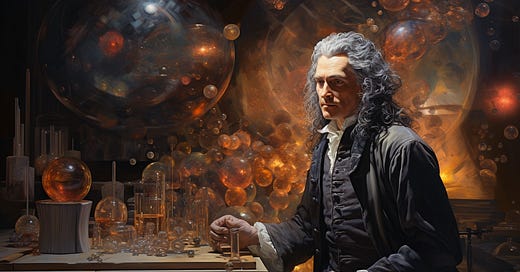Sir Isaac Newton: The Father of Modern Science
Featured in "A Second Chance" by Jodi Taylor
Max and the team from St Mary’s Institute of Historical Research are sent to Cambridge to meet Sir Issac Newton in “A Second Chance” - Book 3 in The Chronicles of St Mary’s series by Jodi Taylor.
Here we explore the life, achievements, and enduring legacy of Isaac Newton.
Sir Isaac Newton, one of history's greatest minds, revolutionized our understanding of the universe through his ground-breaking discoveries in mathematics, physics, and astronomy. From his laws of motion to his theory of universal gravitation, Newton's contributions continue to shape modern science and inspire generations of scientists.
He was born on January 4, 1643, in Woolsthorpe, Lincolnshire, England. His early years were marked by hardship and adversity, as his father died before he was born and his mother remarried, leaving him to be raised by his grandmother. Despite these challenges, Newton displayed exceptional intellectual abilities from a young age and excelled in his studies at the King's School in Grantham.
In 1661, Newton enrolled at Trinity College, Cambridge, where he immersed himself in the study of mathematics, physics, and philosophy. Under the mentorship of renowned mathematician Isaac Barrow, Newton honed his analytical skills and began laying the groundwork for his future discoveries.
Newton's most famous work, "Philosophiæ Naturalis Principia Mathematica" (Mathematical Principles of Natural Philosophy), commonly known as the Principia, was published in 1687. In this monumental work, Newton outlined his three laws of motion and introduced his law of universal gravitation, which states that every particle of matter in the universe attracts every other particle with a force proportional to the product of their masses and inversely proportional to the square of the distance between them. These laws provided a unified framework for understanding the motion of objects on Earth and in space, laying the foundation for classical mechanics and modern physics.
In addition to his work in physics, Newton made significant contributions to mathematics, optics, and astronomy. He developed calculus independently of his contemporary, Gottfried Wilhelm Leibniz, and made pioneering discoveries in the field of optics, including the composition of white light and the nature of colour.
Isaac Newton's contributions to science and mathematics transformed our understanding of the natural world and laid the groundwork for the scientific revolution of the seventeenth and eighteenth centuries. His laws of motion and universal gravitation provided a mathematical framework for describing the behaviour of objects in motion, while his work in optics and calculus paved the way for further advancements in these fields.
Newton's legacy extends far beyond the realm of science, influencing diverse disciplines such as philosophy, theology, and literature. His mechanistic worldview and belief in the power of reason to unlock the mysteries of the universe resonated with Enlightenment thinkers and shaped the intellectual landscape of the eighteenth century.
Isaac Newton's life and work epitomize the spirit of scientific inquiry and discovery. From his humble beginnings in rural England to his ground-breaking contributions to physics and mathematics, Newton's legacy endures as a testament to the power of human intellect and the pursuit of knowledge. As we reflect on his life and achievements, we are reminded of the enduring impact of one of history's greatest scientific minds and the profound influence of his ideas on our understanding of the universe.
Why not read about how Max and the team from St Mary’s get on in their quest to meet him in
“A Second Chance”? Available in paperback, eBook and audiobook formats.
I hope you have enjoyed this foray into history. Please subscribe to enjoy more articles like this.






